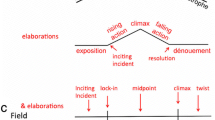Abstract
Narrative tropes are repeated patterns of recognizable communicative elements across stories. Tropes are a set of patterns that aid readers in story comprehension. They are also a reflection of socio-cultural norms that are formally or informally present in the particular context for authors and readers. Trope-based analyses are common in media studies but are limited to close readings and individual analyst perspectives. Distant reading of tropes is challenging due to the lack of precise definitions and the variety of forms in which tropes manifest in language, and over space and time within story worlds. This paper presents a trope labeled dataset of scripts, an initial analysis framework, and a system for computational support of trope analysis. For highlighting the challenges of developing computational models, we present a trope prediction algorithm on a movie script dataset based on a model trained with human-annotated tropes from TVTropes.
Access this chapter
Tax calculation will be finalised at checkout
Purchases are for personal use only
Similar content being viewed by others
References
Barrett, M.S., Stauffer, S.L.: Narrative inquiry: from story to method. In: Narrative Inquiry in Music Education, pp. 7–17. Springer, Heidelberg (2009). https://doi.org/10.1007/978-1-4020-9862-8_2
Barrowman, K.: Origins of the action film: types, tropes, and techniques in early film history. Comp. Action Film, 9–34 (2019)
Bucciferro, C.: Representations of gender and race in ryan coogler’s film black panther: disrupting hollywood tropes. Crit. Stud. Media Commun. 38(2), 169–182 (2021)
Carroll, N.: Interpretation, history and narrative. Monist 73(2), 134–166 (1990)
Chang, C.H., et al.: Situation and behavior understanding by trope detection on films. In: Proceedings of the Web Conference 2021, pp. 3188–3198 (2021)
Gala, D., Khursheed, M.O., Lerner, H., O’Connor, B., Iyyer, M.: Analyzing gender bias within narrative tropes. In: Proceedings of the Fourth Workshop on Natural Language Processing and Computational Social Science, pp. 212–217. Association for Computational Linguistics, Online (2020). https://doi.org/10.18653/v1/2020.nlpcss-1.23. https://www.aclweb.org/anthology/2020.nlpcss-1.23
García-Ortega, R.H., Sánchez, P.G., Merelo-Guervós, J.J.: Tropes in films: an initial analysis. arXiv preprint arXiv:2006.05380 (2020)
Kock, C.: Narrative tropes: a study of points in plots. Occas. Pap. 1977, 202–52 (1976)
Le, Q., Mikolov, T.: Distributed representations of sentences and documents. In: International Conference on Machine Learning, pp. 1188–1196. PMLR (2014)
Marling, W.: Mobile phones as narrative tropes. J. Pop. Film Telev. 36(1), 38–44 (2008)
Mateas, M., Sengers, P.: Narrative Intelligence (Advances in consciousness research, 1381–589X; v. 46). John Benjamins Publishing Company (2003)
Mateas, M., Stern, A.: Interaction and narrative. Game Des. Reader Rules Play Anthol. 1, 642–669 (2006)
Mikolov, T., Sutskever, I., Chen, K., Corrado, G.S., Dean, J.: Distributed representations of words and phrases and their compositionality. Adv. Neural Inf. Process. Syst. 26, 1–9 (2013)
Mishler, E.G.: Models of narrative analysis: a typology. J. Narrat. Life Hist. 5(2), 87–123 (1995)
Paxson, J.J.: Revisiting the deconstruction of narratology: master tropes of narrative embedding and symmetry. Style 35(1), 126–149 (2001)
Squire, C.: Narratives, connections and social change. Narrat. Inq. 22(1), 50–68 (2012)
Underwood, T.: A genealogy of distant reading. DHQ: Dig. Human. Q. 11(2), 1-12 (2017)
Vaswani, A., et al.: Attention is all you need. Adv. Neural Inf. Process. Syst. 30, 1–11 (2017)
Acknowledgements
The authors would like to thank the reviewers for their insightful comments and feedback. We would also like to thank the TVTropes and IMSDb community for providing a curated dataset of thousands of tropes and scripts. Finally, we would like to thank Dr. Chris Martens.
Author information
Authors and Affiliations
Corresponding author
Editor information
Editors and Affiliations
Rights and permissions
Copyright information
© 2022 The Author(s), under exclusive license to Springer Nature Switzerland AG
About this paper
Cite this paper
Chaudhary, M.S., Jhala, A. (2022). Computational Support for Trope Analysis of Textual Narratives. In: Vosmeer, M., Holloway-Attaway, L. (eds) Interactive Storytelling. ICIDS 2022. Lecture Notes in Computer Science, vol 13762. Springer, Cham. https://doi.org/10.1007/978-3-031-22298-6_34
Download citation
DOI: https://doi.org/10.1007/978-3-031-22298-6_34
Published:
Publisher Name: Springer, Cham
Print ISBN: 978-3-031-22297-9
Online ISBN: 978-3-031-22298-6
eBook Packages: Computer ScienceComputer Science (R0)




